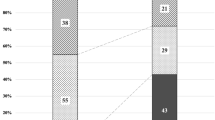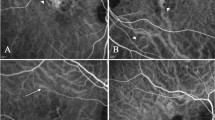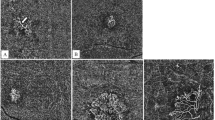Abstract
Objectives
To define the differentiating features of pachychoroid neovasculopathy (PNV) and neovascular age-related macular degeneration (nAMD) without dye angiography.
Methods
This study included treatment-naive 50 PNV patients and 50 nAMD patients with unilateral Type 1 macular neovascularisation (MNV). The studied optical coherence tomography (OCT) features were subretinal hyperreflective material, intraretinal cysts, choroidal thickness (CT), pigment epithelial detachment (PED), retinal pigment epithelium (RPE) changes, and types of drusen. The choroidal vascularity index (CVI) was calculated. Intervortex venous anastomosis, MNV subtypes, and the main trunk appearance on OCT angiography (OCTA) were evaluated. Features with an area under the receiver operating characteristic curve (AUC) above 0.75 were defined as major, while those between 0.60 and 0.75 were defined as minor differentiating features.
Results
Five features met the criteria for major differentiating features: age ≤60 years, SFCT ≥ 254 µm in the diseased eye, CVI ≥ 72% in the diseased eye, SFCT ≥ 323 µm in the fellow eye, and the absence of soft drusen. Six features met the criteria for minor differentiating features: CVI ≥ 74% in the fellow eye, absence of serous PED, absence of reticular drusen, presence of intervortex anastomoses, presence of immature MNV, and absence of the main trunk on OCTA. The sensitivity, specificity, positive predictive value, negative predictive value, and AUC for at least three major and at least three minor differentiating features are 0.88, 0.96, 0.96, 0.89, and 0.92, respectively.
Conclusion
At least three major and three minor criteria must be present to confidently diagnose PNV.
This is a preview of subscription content, access via your institution
Access options
Subscribe to this journal
Receive 18 print issues and online access
$259.00 per year
only $14.39 per issue
Buy this article
- Purchase on SpringerLink
- Instant access to the full article PDF.
USD 39.95
Prices may be subject to local taxes which are calculated during checkout


Similar content being viewed by others
Data availability
The datasets generated during and /or analysed during the current study are available from the corresponding author on reasonable request.
References
Vyawahare H, Shinde P. Age-related macular degeneration: epidemiology, pathophysiology, diagnosis, and treatment. Cureus. 2022;14:e29583.
Constable I, Shen WY, Rakoczy E. Emerging biological therapies for age-related macula degeneration. Expert Opin Biol Ther. 2005;5:1373–85.
Farazdaghi MK, Ebrahimi KB. Role of the choroid in age-related macular degeneration: a current review. J Ophthalmic Vis Res. 2019;14:78–87.
Spaide RF, Jaffe GJ, Sarraf D, Freund KB, Sadda SR, Staurenghi G, et al. Consensus nomenclature for reporting neovascular age-related macular degeneration data: consensus on neovascular age-related macular degeneration nomenclature study group. Ophthalmology. 2020;127:616–36.
Jung JJ, Chen CY, Mrejen S, Gallego-Pinazo R, Xu L, Marsiglia M, et al. The incidence of neovascular subtypes in newly diagnosed neovascular age-related macular degeneration. Am J Ophthalmol. 2014;158:769–79.e2.
Spaide RF, Gemmy Cheung CM, Matsumoto H, Kishi S, Boon CJF, van Dijk EHC, et al. Venous overload choroidopathy: a hypothetical framework for central serous chorioretinopathy and allied disorders. Prog Retin Eye Res. 2022;86:100973.
Sakurada Y, Leong BCS, Parikh R, Fragiotta S, Freund KB. Association between choroidal caverns and choroidal vascular hyperpermeability in eyes with pachychoroid diseases. Retina. 2018;38:1977–83.
Dansingani KK, Balaratnasingam C, Naysan J, Freund KB. En face imaging of pachychoroid spectrum disorders with swept-source optical coherence tomography. Retina. 2016;36:499–516.
Pang CE, Freund KB. Pachychoroid neovasculopathy. Retina. 2015;35:1–9.
Fung AT, Yannuzzi LA, Freund KB. Type 1 (sub-retinal pigment epithelial) neovascularization in central serous chorioretinopathy masquerading as neovascular age-related macular degeneration. Retina. 2012;32:1829–37.
Miyake M, Ooto S, Yamashiro K, Takahashi A, Yoshikawa M, Akagi-Kurashige Y, et al. Pachychoroid neovasculopathy and age-related macular degeneration. Sci Rep. 2015;5:16204.
Dansingani KK, Balaratnasingam C, Klufas MA, Sarraf D, Freund KB. Optical coherence tomography angiography of shallow irregular pigment epithelial detachments in pachychoroid spectrum disease. Am J Ophthalmol. 2015;160:1243–54.e2.
Demirel S, Yanik O, Nalci H, Batioglu F, Ozmert E. The use of optical coherence tomography angiography in pachychoroid spectrum diseases: a concurrent comparison with dye angiography. Graefes Arch Clin Exp Ophthalmol. 2017;255:2317–24.
Braaf B, Vienola KV, Sheehy CK, Yang Q, Vermeer KA, Tiruveedhula P, et al. Real-time eye motion correction in phase-resolved OCT angiography with tracking SLO. Biomed Opt Express. 2013;4:51–65.
Spaide RF, Fujimoto JG, Waheed NK, Sadda SR, Staurenghi G. Optical coherence tomography angiography. Prog Retin Eye Res. 2018;64:1–55.
Bicer O, Demirel S, Yavuz Z, Batioglu F, Ozmert E. Comparison of morphological features of type 1 CNV in AMD and pachychoroid neovasculopathy: an OCTA study. Ophthalmic Surg Lasers Imaging Retin. 2020;51:640–7.
Azar G, Wolff B, Mauget-Faysse M, Rispoli M, Savastano MC, Lumbroso B. Pachychoroid neovasculopathy: aspect on optical coherence tomography angiography. Acta Ophthalmol. 2017;95:421–7.
Spaide RF. Disease expression in nonexudative age-related macular degeneration varies with choroidal thickness. Retina. 2018;38:708–16.
Lee J, Byeon SH. Prevalence and clinical characteristics of pachydrusen in polypoidal choroidal vasculopathy: multimodal image study. Retina. 2019;39:670–8.
Takahashi A, Hosoda Y, Miyake M, Miyata M, Oishi A, Tamura H, et al. Clinical and genetic characteristics of pachydrusen in eyes with central serous chorioretinopathy and general Japanese individuals. Ophthalmol Retin. 2021;5:910–7.
Hage R, Mrejen S, Krivosic V, Quentel G, Tadayoni R, Gaudric A. Flat irregular retinal pigment epithelium detachments in chronic central serous chorioretinopathy and choroidal neovascularization. Am J Ophthalmol. 2015;159:890–903.e3.
Kuranami A, Maruko R, Maruko I, Hasegawa T, Iida T. Pachychoroid neovasculopathy has clinical properties that differ from conventional neovascular age-related macular degeneration. Sci Rep. 2023;13:7379.
Cheung CMG, Lee WK, Koizumi H, Dansingani K, Lai TYY, Freund KB. Pachychoroid disease. Eye (Lond). 2019;33:14–33.
Savastano MC, Rispoli M, Savastano A, Lumbroso B. En face optical coherence tomography for visualization of the choroid. Ophthalmic Surg Lasers Imaging Retin. 2015;46:561–5.
Shiihara H, Sonoda S, Terasaki H, Kakiuchi N, Yamashita T, Uchino E, et al. Quantitative analyses of diameter and running pattern of choroidal vessels in central serous chorioretinopathy by en face images. Sci Rep. 2020;10:9591.
Matsumoto H, Hoshino J, Mukai R, Nakamura K, Kikuchi Y, Kishi S, et al. Vortex vein anastomosis at the watershed in pachychoroid spectrum diseases. Ophthalmol Retin. 2020;4:938–45.
Mendonca LSM, Perrott-Reynolds R, Schwartz R, Madi HA, Cronbach N, Gendelman I, et al. Deliberations of an international panel of experts on OCT angiography nomenclature of neovascular age-related macular degeneration. Ophthalmology. 2021;128:1109–12.
Landis JR, Koch GG. The measurement of observer agreement for categorical data. Biometrics. 1977;33:159–74.
Spaide RF, Koizumi H, Pozzoni MC. Enhanced depth imaging spectral-domain optical coherence tomography. Am J Ophthalmol. 2008;146:496–500.
Sonoda S, Sakamoto T, Yamashita T, Shirasawa M, Uchino E, Terasaki H, et al. Choroidal structure in normal eyes and after photodynamic therapy determined by binarization of optical coherence tomographic images. Invest Ophthalmol Vis Sci. 2014;55:3893–9.
Ruopp MD, Perkins NJ, Whitcomb BW, Schisterman EF. Youden Index and optimal cut-point estimated from observations affected by a lower limit of detection. Biom J. 2008;50:419–30.
Cheung CMG, Lai TYY, Teo K, Ruamviboonsuk P, Chen SJ, Kim JE, et al. Polypoidal choroidal vasculopathy: consensus nomenclature and non-indocyanine green angiograph diagnostic criteria from the Asia-Pacific Ocular Imaging Society PCV Workgroup. Ophthalmology. 2021;128:443–52.
Spaide RF, Ledesma-Gil G, Gemmy Cheung CM. Intervortex venous anastomosis in pachychoroid-related disorders. Retina. 2021;41:997–1004.
Matsumoto H, Hoshino J, Arai Y, Mukai R, Nakamura K, Kikuchi Y, et al. Quantitative measures of vortex veins in the posterior pole in eyes with pachychoroid spectrum diseases. Sci Rep. 2020;10:19505.
Demirel S, Ayaz RE, Yanik O, Batioglu F, Ozmert E, Iovino C, et al. Quantitative assessment of intervortex anastomosis in central serous chorioretinopathy and fellow eyes: Does the size of anastomotic vessels matter for the diagnosis?. Graefes Arch Clin Exp Ophthalmol. 2024;262:3509–17.
Terao N, Koizumi H, Kojima K, Yamagishi T, Yamamoto Y, Yoshii K, et al. Distinct aqueous humour cytokine profiles of patients with pachychoroid neovasculopathy and neovascular age-related macular degeneration. Sci Rep. 2018;8:10520.
Demirel S, Guran Begar P, Yanik O, Batioglu F, Ozmert E. Visualization of type-1 macular neovascularization secondary to pachychoroid spectrum diseases: a comparative study for sensitivity and specificity of indocyanine green angiography and optical coherence tomography angiography. Diagnostics (Basel). 2022;12:1368.
Yanik O, Demirel S, Ozcan G, Batioglu F, Ozmert E. Qualitative and quantitative comparisons of type 1 macular neovascularizations between pachychoroid neovasculopathy and neovascular age-related macular degeneration using optical coherence tomography angiography. Eye (Lond). 2024;38:1714–21.
Miki A, Kusuhara S, Otsuji T, Kawashima Y, Miki K, Imai H, et al. Photodynamic therapy combined with anti-vascular endothelial growth factor therapy for pachychoroid neovasculopathy. PLoS One. 2021;16:e0248760.
Iu LPL, Chan HY, Ho M, Lai FHP, Mak ACY, Wong RLM, et al. The contemporary role of photodynamic therapy in the treatment of pachychoroid diseases. J Ophthalmol. 2021;2021:6590230.
Demirel S, Yanik O, Batioglu F, Ozmert E. Treatment outcomes of photodynamic therapy and findings predicting treatment success in pachychoroid-associated neovascularization. Eur J Ophthalmol. 2022;32:1662–70.
Klein R, Klein BE, Jensen SC, Meuer SM. The five-year incidence and progression of age-related maculopathy: the Beaver Dam Eye Study. Ophthalmology. 1997;104:7–21.
Yu JJ, Agron E, Clemons TE, Domalpally A, van Asten F, Keenan TD, et al. Natural history of drusenoid pigment epithelial detachment associated with age-related macular degeneration: age-related eye disease study 2 report no. 17. Ophthalmology. 2019;126:261–73.
Borrelli E, Reibaldi M, Bandello F, Lanzetta P, Boscia F. Ensuring the strict and accurate adherence to inclusion criteria in clinical trials for AMD is crucial. Eye (Lond). 2024;38:3037–8.
Author information
Authors and Affiliations
Contributions
SD was responsible for designing the protocol, writing the protocol and report, conducting the research, extracting and analysing data, interpreting results, writing. PAE contributed to writing the report, extracting and analysing data, interpreting results, and creating figures and tables. OY conducted the analyses and contributed to the design of the protocol. CG, JC and AK were drafting the work or reviewing it critically for important intellectual content. FB was responsible for designing the protocol and provided feedback on the report.
Corresponding author
Ethics declarations
Competing interests
The authors received no financial support for the research, authorship, and/or publication of this article. CMGC is a member of the Eye editorial board.
Additional information
Publisher’s note Springer Nature remains neutral with regard to jurisdictional claims in published maps and institutional affiliations.
Supplementary information
Rights and permissions
Springer Nature or its licensor (e.g. a society or other partner) holds exclusive rights to this article under a publishing agreement with the author(s) or other rightsholder(s); author self-archiving of the accepted manuscript version of this article is solely governed by the terms of such publishing agreement and applicable law.
About this article
Cite this article
Demirel, S., Ellialtıoğlu, P.A., Yanık, Ö. et al. Non-indocyanine green angiography non-invasive differentiating features in the differential diagnosis of pachychoroid neovasculopathy and neovascular age-related macular degeneration: a sensitivity-specificity study. Eye 39, 3090–3098 (2025). https://doi.org/10.1038/s41433-025-04039-y
Received:
Revised:
Accepted:
Published:
Version of record:
Issue date:
DOI: https://doi.org/10.1038/s41433-025-04039-y



